- Appearance of baby’s first tooth is an extremely important milestone in their life and a joyous moment for Parents as well.
- But unfortunately, this amazing moment can turn into Parents’ most dreaded nightmare due to the discomfort that it may bring along in the babies.
- While Teething may bring a lot of discomfort to some children, other kids may sail through this period pretty well with very minimum symptoms/signs.
- Therefore, to save yourself from the misery, its important for all the Young Parents/ would-be Parents to know some common signs/symptoms of teething and some basic tips with which you can effectively manage your fussy teething baby at home.
- But before that, Lets get into What exactly is Teething and when does it usually start in babies?
- Teething is a normal process which infants go through when their teeth starts breaking through the gum line. This period may start as early as 3-4 months of age and the first tooth usually appears by 6-7 months of age. Since then teething continues on and off till the age of 2-3. So, by the time the child is 3 years old, they’ll have an entire set of 20 teeth.
- But since, tooth eruption process involves the teeth cutting through the delicate gums, it may result in slight inflammation and discomfort. Therefore, some of the common teething symptoms which might arise in babies are listed below.
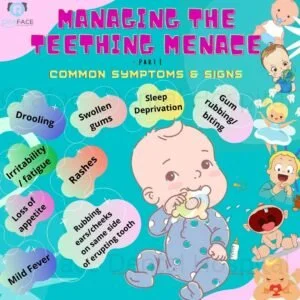
How do I Know whether my baby is having fever due to teething or other illness ?
-
Since teething process involves the teeth breaking through the delicate gums, it results in some amount of inflammation around the area. This is responsible for causing the mild fever that babies might experience during this time.
Parents must NOTE -
-
- The so called “teething-fever” isn’t usually high enough to be considered as an actual fever. According to American Academy of Pediatrics (AAP), there is usually, “very slight increase in temperature” whenever babies are growing a new tooth.
- This mild rise in temperature is usually less than 100 degrees Fahrenheit, which is usually considered to be mild fever which may begin one day prior to the eruption of teeth and may last up till the tooth breaks out into the mouth. This fever usually goes down on its own within a couple of days.
- It is also important for parents to note that, any temperature above 101 degrees Fahrenheit should be considered due to reasons other than teething. This is when they should seek the consultation of a Pediatrician. NEVER self medicate your child.
Does teething cause diarrhoea in babies ?
- As you cradle your fussy baby to sleep, you may remember about their teething time and it might suddenly strike you whether teething and diarrhoea is related.
- But, despite what many Parents might tell you, the statement that “Teething causes Diarrhoea” is an ABSOLUTE MYTH.
- According to AAP(American Academy of Pediatrics), there is absolutely no correlation between teething and diarrhoea.
- However, Parents must note that, teething period is a very important growth spurt, wherein a lot of developmental changes and transitions take place in a child.
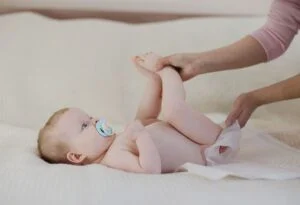
- Most babies start teething during 4-7 months and that’s when some early bloomers may get their first teeth in the mouth. As a matter of fact, this is also the time when the child starts exploring the world with their mouth and sucking their fingers continuously.
- This is also the time of transition from breastfeeding to soft solid food. Some babies, during this transition may have a certain drop in the levels of their maternal antibodies due to which they are most likely to pick up an infection, leading to loose stools.
- Nevertheless, if the child ends up having loose stools, its important for the parent to consider that the child stays hydrated well throughout to treat their diarrhoea.
- Watch out for the number of times your baby poops in a day, the smell, consistency of the stool. Diarrhea persisting longer than 1 week, dry mouth, dull and fussiness be some of the signs of dehydration and that may be a good time to see a pediatrician.
Can ear/cheek rubbing be absolutely related to teething ?
- While some children in their teething stage do pull their ear/cheek on the same side of tooth eruption, however it is not very common.
- Since the gums are tender and sore, the pain from the gums travel to eardrums and jaws, which is why they tend to pull their ears or clench on their jaws hard frequently.
NOTE : Although, rubbing or pulling the ears is seen as a sign of teething in younger children (less than 2 or 3 years), Parents must lookout for ear pulling alongwith constant crying and fever. This can be the result of some underlying infection and time to consult a paediatrician for the same.
Should I be worried if teething affects my baby's appetite ?
- It is important to understand that, babies can lose their appetite or refuse food due to a lot of reasons. It can be related to their physiological growth spurts or any underlying illness.
- The general rule of thumb is that babies eat when they are hungry.
- But, for parents, it could be quite intimidating if their baby isn’t eating well, which may seem like they have lost their appetite.
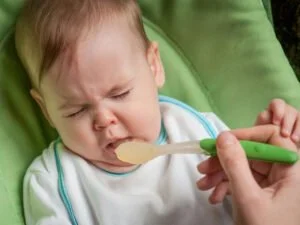
- Loss of appetite due to teething is temporary. The pain caused by the teeth breaking in through the gums causes them to shy away from food. You may notice that your baby isn’t eating their usual amount of food at each meal, or even skips the entire meal sometimes. You may also find that they may turn away from the bottle or breast before a full feed, or may reject the bottle or breast altogether.
- This temporary “hunger strike” may resolve within a few days. however, if the baby does not gain a normal appetite in 2 weeks, you must consider other medical issues and consult a paediatrician immediately.
Teething or Cold? How do I know ?
- Both Teething and cold could present some common symptoms like drooling, mild temperatures, irritability, loss of appetite and mild runny noses.
- It is important to note how long these symptoms last. While the symptoms occurring purely due to teething may be on-and-off, the symptoms of cold may be present throughout. The longer the symptoms last, the less likely it is due to teething.
- Check for your baby’s body temperature. Anything higher than 100 degrees F says a different story than teething. If your baby’s diarrhoea continues for more than a day or two, or if they aren’t sleeping well for almost 4 to 5 nights continuously, it is time to consult a paediatrician immediately than blaming it on an a tooth.
How do I manage my baby's Teething Menace ?
- Now, that you know all about the symptoms/signs of teething, let’s see how you can effectively manage your fussy or cranky teething baby at home. Dive in right away for some foolproof tips that will not only help you soothe your baby but also will save you a peaceful good night’s sleep.
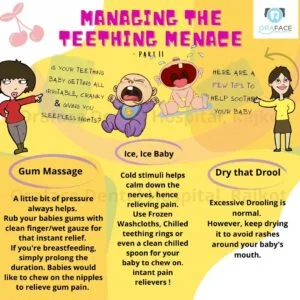
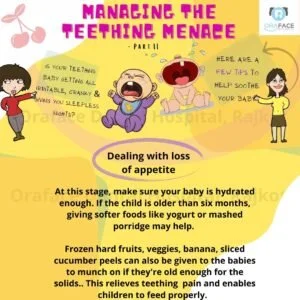
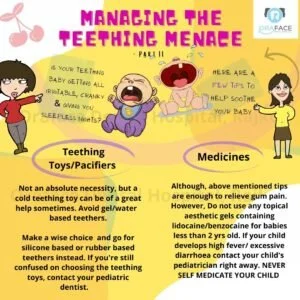
Are there any things which I should be careful of / avoid giving my teething baby ?
- YES! Never use over-the-counter pain relief gels which contain Benzocaine for your teething baby.The anaesthetic compound, ie, Benzocaine in these products can cause a rare but serious blood disorder called methemoglobinemia.
- Be careful while choosing a pacifier/teething toy for your babies.
It is extremely vital to choose your baby’s teething toys wisely because that’s going to go in your baby’s mouth and they’ll mostly chew or suck on it. Therefore, certain things should be kept in mind while choosing a teething toy –
- Materials – Be very vigilant on the materials your baby’s teething toy is made of.
Avoid pacifiers made of toxic materials like:
- Bisphenol-a (BPA)
- Poly Vinyl Chloride(PVC)
- Latex
- Varnishes, Paints, Stains
- Cadmium
Instead, go for Alternative materials like:
- 100% natural rubber
- Untreated natural hard wood
- 100% organic cotton
- Food grade silicon
- Food grade safe plastics.
2. Fillings – Gel/water based teethers are best avoided. If these teethers accidentally tear off, the contents may ooze out in the child’s mouth.
3. Size – Choose an appropriate size of teething toy for your baby.
Make sure it isn’t too small, that they could stick it entirely in their mouth and choke on it as they have a really small airway.
4. Be careful of using amber necklaces based teething rings. They have the risk of choking if the beads break off.
However, While your baby’s teeth are erupting, if you notice any big bluish/reddish swelling on your child’s gums which is painful and interferes on eating, meet your child’s Pediatric Dentist right away.
At Oraface, We are proud to have a collaborative team of like-minded professionals to help You and your family have Sleep, Breathe and Smile better!
The First and Exclusive in Gujarat!
If you have any questions, write to us or you can schedule a consultation with us.

